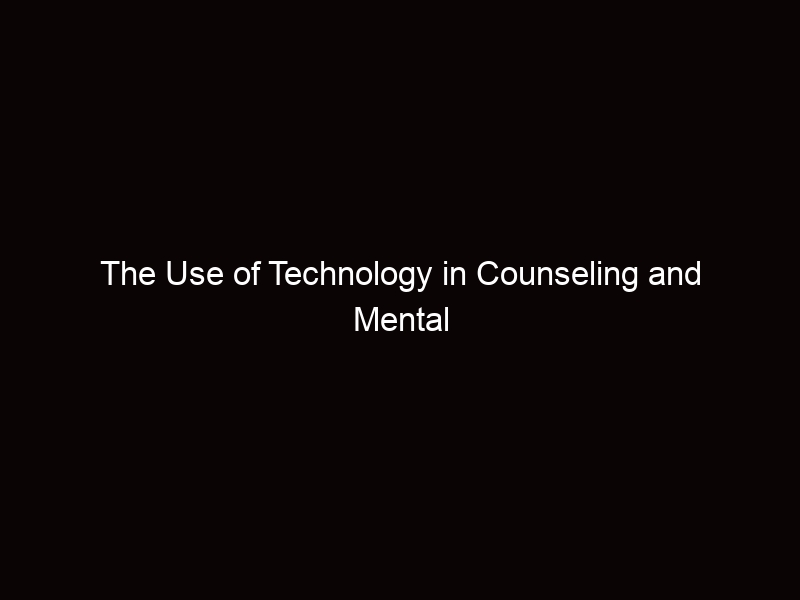Gone are the days when mental health was a taboo subject. With increasing mental health awareness,
people are no longer afraid to talk about their addictions and mental illnesses. Mental health plays a
huge role in your overall wellness. For starters, your physical well-being depends on a healthy mind.
It’s not uncommon for mental health patients to exhibit physical symptoms such as backaches,
insomnia, and fatigue. You’re also more likely to be productive when you take care of your mental
health. Additionally, a healthy mind raises your self-esteem, improving interpersonal relationships. The
increased mental health awareness has paved the way for technology in counseling and mental health.
Benefits of Technology in Counseling with Mental Health
Tech use relieves depression and anxiety symptoms among adolescents. This is according to recent
findings by Duke University. Although excessive technology use increased behavioral problems like
fighting and lying, the study’s participants were less anxious and depressed on days when they texted
more. So, how does technology help mental health? By connecting like-minded individuals, digital
technology reduces loneliness among users.
Technology also comes in handy for research. You don’t have to go to the library to read about mental
illnesses. You can learn more about a condition by doing a quick internet search. Moreover, healthcare
providers can treat their patients without meeting them physically. That way, even patients in remote
areas can benefit from the virtual pool of mental health experts. Likewise, you can schedule a session at your convenience, whether you’re on a train, at home, or on your way to the office. Because consultations are anonymous, clients don’t have to worry about the stigma when seeking treatment.
Since you’re not traveling to meet the therapist, online services might be cheaper than in-person
consultations. Some services are even free. Additionally, you can use technology to sharpen your coping
skills. For example, you can or take an online course on anxiety management.
Tech Innovations for Mental Health
The benefits of technology on mental health are evident in numerous innovations. They include:
Mobile Apps
You can use applications anywhere since they run on mobile devices instead of desktop computers.
Mental health apps serve different purposes. The first one is illness management. Apart from peer
support, this app category allows real-time communication between patients and healthcare providers.
You could also use some apps for relaxation.
In addition to breathing exercises, these applications contain smooth music to ease you into meditation.
Not forgetting symptom tracking apps. By capturing your movement patterns and the frequency of your
texts and calls, these applications help track your state of mind and provide real-time feedback.
Virtual Reality in Mental Health
VR is increasing in popularity as an exposure therapy tool. By recreating memories in controlled
conditions, exposure therapy familiarizes patients with their trauma to facilitate PTSD recovery. Patients
wear headsets that simulate traumatic events using sounds and images as the therapist desensitizes
them to the triggers.
Virtual reality also provides insight into social rejection for borderline personality disorder treatment.
BPD patients struggle to control their emotions, especially towards people around them.
Telehealth
This technology connects patients to medical professionals via phone and video chats. Telehealth
presents numerous benefits. For starters, it addresses the dwindling mental health workforce. One
doctor can serve patients from all over the world.
Additionally, telehealth increases treatment access to homebound patients. The technology also
enhances aftercare by helping therapists follow up with their patients.
Wearables
Wearables contain sensors that track a patient’s physical indicators to increase their mental health
awareness. Wearables take different forms. For example, wristbands record pulse rate, skin
conductance, and body temperatures and relay the information to an application for personalized
recommendations.
Another wearable technology in counseling and mental health is headbands. Headsets monitor real-time
brain activity and trigger neuron communication through electric stimulation.
Using Technology Safely
Despite the benefits of technology in mental health, overreliance hurts your social interactions and
exposes you to internet addiction and cyberbullying. You also risk eyestrain, sleep, and posture
problems.
The first tip of safe tech use is getting busy. Instead of checking your phone, create a list of activities for
your idle moments. You could meditate, update your journal, take walks, or dance. Moreover, disable
notifications and keep your devices out of sight to avoid temptations. You can also unplug your router
during certain hours of the day to prevent internet access.
Likewise, record your tech use to know its effect on your emotional wellbeing. It’s easy to break a
pattern when you understand it first. You could write down the sites you visit, how long you spend on
them daily, and your progress in beating tech addiction.
Conclusion
The advent of technology trends in counseling and psychotherapy and mental health doesn’t mean you should ditch your wellness routine. Combine technology with exercise, mindfulness, and healthy eating. What’s more, follow your
therapist’s advice. How does technology help mental health? Mention your favorite tech innovations for
mental health in the comments. Don’t forget to check our blog for weekly mental health posts also check out the apps and software category for more apps.


